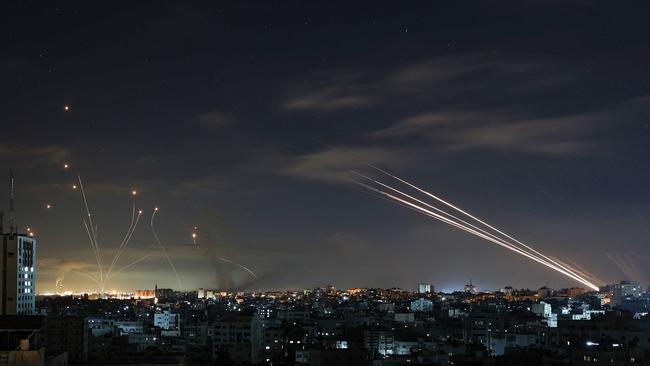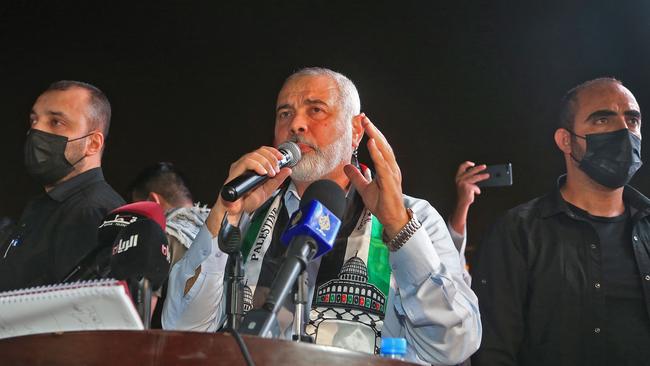
Salvos of incoming rockets, fired from Gaza, have blazed a trail across the dark sky.
Above Israel they have been met with Tamir interceptor missiles, fired from Israel’s Iron Dome missile defence batteries.
The colourful streaks across the night sky, and the soft thud heard as the Tamir missile detonates near its target, belie the panic and terror being felt on the ground.
In Israel, the air raid sirens are wailing and the young and old are scrambling for the bomb shelter.
In Gaza, the residents listen in fear for the low roar of Israeli F-16s on their approach, conducting airstrikes in response.
Though they were only young at the time, my children still remember being woken early one Saturday morning by the air raid siren and running to the bomb shelter in the basement of the Australian ambassador’s residence in Tel Aviv.
My then six-year-old daughter left her favourite soft blanket upstairs and was arguing to retrieve it. Our geriatric golden retriever, adopted a few months earlier from an animal rescue shelter, had to be carried down the stairs. Our cat, who had travelled from Australia with us, was too independent-minded to take orders. He was left to fend for himself.
This was the summer of 2014, when the last major conflict between Israel and Hamas in Gaza erupted. That conflict lasted over 50 days, and resulted in hundreds of lives lost.
A clever Israeli created an app, Red Alert, to alert you to incoming rockets and their likely destination. We all downloaded it and turned the notifications on.
I still have the app on my phone. I can see that, in the past 10 minutes while writing this, Hamas has fired salvos of rockets towards Rishon LeZion, Petach Tikva, Holon and Kiryat Ono: each a well-known suburb of Tel Aviv.
Media commentary, reaching for a simplistic explanation, has sought to portray this latest conflict between Israel and Hamas as the natural conclusion of high intercommunal tensions in Jerusalem in recent weeks.
These have witnessed clashes between police and Arab youth around the Damascus Gate, an entry point to the Old City, and a protracted legal dispute between Jewish claimants and Palestinian occupants in the East Jerusalem neighbourhood of Sheikh Jarrah.
But the idea that these tensions led to Hamas firing rockets into Israel from Gaza is a complete non sequitur.
As in 2014, Hamas has acted now in an attempt to exploit and capitalise on tensions within Israel to recover its primacy and relevance in Palestinian politics, and to refocus international attention on the Israeli-Palestinian conflict.
Hamas does a miserable job in ruling Gaza. Its citizens live in misery, hostage to a regime that cares nought for their welfare.
As a terrorist group committed to armed conflict, Hamas’ sole reason for being is to destroy Israel, not to govern well. Its entire legitimacy rests upon frequent conflict with Israel, and it must periodically refresh its anti-Zionist credentials.
Hamas knows it cannot ever win a war with Israel. But if it can episodically give Israel a bloody nose, and grab the Arab world’s attention, regardless of the cost this imposes on the Palestinian population of Gaza, then that is enough.

Hamas’ indiscriminate firing of rockets at Israeli civilian populations is indefensible, and against the laws of armed conflict.
Israel has a clear legal and moral right to defend itself against such attacks, just as any nation would if under similar attack.
This right to self-defence clearly includes destroying rocket-launch sites within Gaza and Hamas’ military leadership and infrastructure, which has been the focus of Israel’s military response.
Trying to ascribe some sort of moral equivalence between the actions of Israel and Hamas, which is implied in the frequent formulation urging “restraint on both sides”, is at once naive and preposterous.
Israel’s Iron Dome missile defence system, which is highly effective but not perfect, has helped minimise casualties on the Israeli side. But it has also helped protect Gaza’s civilian population.
Without Iron Dome to protect its population, Israel would have been forced by now to hit Gaza with overwhelming force in order to stop the rocket attacks. In such a scenario, civilian casualties within Gaza would readily reach the thousands.
With the complicated motivations of Hamas, this will not be an easy conflict to end.
Israel will seek to degrade Hamas’ military capability and deter future provocations. But it has no desire to engage in regime change or reoccupy Gaza, from which it withdrew in 2005. Hamas will keep firing rockets until it feels it has won a propaganda victory, or until it has absorbed so much punishment that its rule on Gaza becomes threatened. It is indifferent to the hardship this will cause the Gazan population. This is the macabre calculus.
Prior to this eruption of violence, Israel was inching towards a new political dispensation.
It looked like the grip of the great survivor of Israeli politics, Benjamin Netanyahu, on the prime minister’s office was finally loosening, with a new coalition government close to formation.
And it seemed that, for the first time since Israel’s birth as a nation in 1948, one of the Arab-Israeli political parties, the United Arab List, would sit within the governing coalition — a watershed moment for inter-communal relations.
But the Hamas attack on Israel has scuttled both.
It has resuscitated Netanyahu’s political fortunes, given his security credentials.
And it has inflamed tensions between Arab and Jewish communities in Israel, making a new governing coalition with Arab political support almost impossible, to the ultimate detriment of Israel’s 1.8 million Arab citizens.
Hamas’ attack on Israel looks certain to prove the adage that there are no winners in war, only losers.
Dave Sharma represents the federal electorate of Wentworth in Sydney and was ambassador to Israel from 2013-17.




The skies above Israel have been lit up these past several nights.